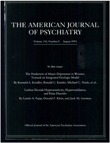Comorbid association of autism and schizophrenia
Abstract
OBJECTIVE: In the last several decades, considerable evidence has suggested that autism and schizophrenia are unrelated. However, recent reports have suggested that individuals with autism may be at greater risk for schizophrenia and that the conditions may be more closely related than generally believed. METHOD: The authors examined detailed case records of 163 adolescents and adults with well-documented histories of autism. These cases included 139 males and 24 females. RESULTS: Only one individual had an unequivocal history of schizophrenia. CONCLUSIONS: If the present study group is taken to be representative, it appears that the frequency of schizophrenia among autistic patients (0.6%) is roughly comparable to the frequency of schizophrenia in the general population. It does not appear that the two conditions are more commonly observed together than would be expected on a chance basis; therefore, the current (DSM-III-R) approach to dual diagnosis of these conditions appears reasonable.
Access content
To read the fulltext, please use one of the options below to sign in or purchase access.- Personal login
- Institutional Login
- Sign in via OpenAthens
- Register for access
-
Please login/register if you wish to pair your device and check access availability.
Not a subscriber?
PsychiatryOnline subscription options offer access to the DSM-5 library, books, journals, CME, and patient resources. This all-in-one virtual library provides psychiatrists and mental health professionals with key resources for diagnosis, treatment, research, and professional development.
Need more help? PsychiatryOnline Customer Service may be reached by emailing [email protected] or by calling 800-368-5777 (in the U.S.) or 703-907-7322 (outside the U.S.).



